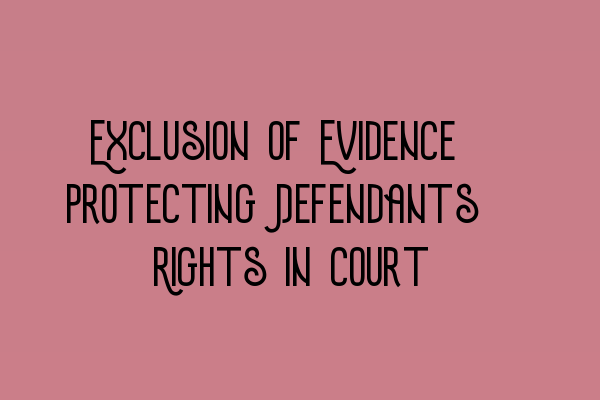Exclusion of Evidence: Protecting Defendants’ Rights in Court
In the criminal justice system, the exclusion of evidence plays a crucial role in protecting the rights of defendants. This legal principle ensures that evidence obtained unlawfully or in violation of the defendant’s rights is excluded from being considered by the court during trial. Understanding the rules and procedures surrounding the exclusion of evidence is vital for criminal law practitioners and defendants alike. In this article, we will explore the importance of excluding evidence and the impact it has on defendants’ rights.
Why is Excluding Evidence Important?
Excluding evidence in criminal trials serves several important purposes. Firstly, it upholds the principle of fairness by preventing the use of evidence that has been unlawfully obtained. This ensures that defendants are not unfairly prejudiced by evidence that should not have been used against them.
Secondly, the exclusion of evidence helps to maintain the integrity of the justice system. When evidence is obtained through illegal search and seizure, coercion, or other violations of a defendant’s rights, its use in court can undermine the public’s confidence in the system. Excluding such evidence ensures that trust in the justice system is not eroded.
Furthermore, excluding evidence acts as a deterrent to law enforcement officers and other authorities, discouraging them from engaging in unlawful behavior when gathering evidence. By imposing consequences for the violation of defendants’ rights, the exclusionary rule helps to promote lawful and ethical conduct during criminal investigations.
When Can Evidence be Excluded?
The exclusion of evidence is not automatic; certain criteria must be met for evidence to be excluded from court proceedings. The most common grounds for exclusion include:
- Unlawful Search and Seizure: If evidence is obtained by conducting a search without a proper warrant or in a manner that violates the Fourth Amendment rights of the accused, it can be excluded.
- Coerced Confessions: If a confession is obtained through coercion, duress, or other forms of unlawful pressure, it may be excluded from trial.
- Violations of Miranda Rights: If a defendant’s Miranda rights, such as the right to remain silent or the right to an attorney, are violated during the interrogation process, any incriminating statements made may be excluded.
- Chain of Custody Issues: If there are concerns regarding the integrity or authenticity of physical evidence due to mishandling or improper storage, it may be excluded.
These are just a few examples of situations in which evidence can be excluded. It is essential for criminal law practitioners to be well-versed in the rules surrounding the exclusion of evidence to effectively protect the rights of their clients.
Protecting Defendants’ Rights: The Role of Criminal Law Practitioners
As criminal law practitioners, our role is to ensure that our clients’ rights are upheld throughout the legal process. When it comes to the exclusion of evidence, we play a vital role in identifying potential violations and filing appropriate motions to have evidence excluded from trial.
To effectively protect our clients, we must stay updated on recent developments in case law and precedents related to the exclusion of evidence. This is why continuous professional development and staying informed about the latest legal updates are crucial for criminal law practitioners.
At SQE Criminal Law & Practice Law UK, we understand the importance of comprehensive legal knowledge and continuous learning. We offer SQE 1 and SQE 2 preparation courses to help aspiring solicitors enhance their skills and knowledge in criminal law. Additionally, our practice exam questions and mock exams provide valuable practice opportunities for SQE 1 candidates.
To know more about our SQE preparation courses and SRA SQE exam dates, please visit the following links:
The exclusion of evidence is a fundamental principle in the criminal justice system that protects defendants’ rights and ensures the fairness and integrity of court proceedings. As criminal law practitioners, it is our duty to advocate for the exclusion of unlawfully obtained evidence and to stay updated on the latest legal developments in this area.
If you are aspiring to become a criminal law solicitor, SQE Criminal Law & Practice Law UK can support your journey with our comprehensive SQE preparation courses. Don’t hesitate to explore our resources and take advantage of our practice exam questions and mock exams to enhance your skills.
